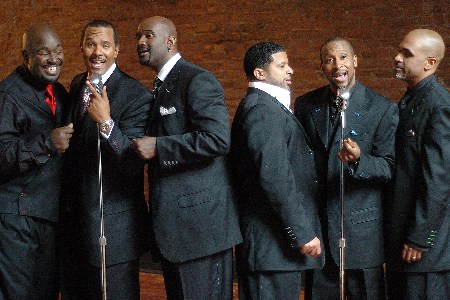The a cappella jazz
group known as Take 6 are not only the heirs to the rich tradition of
the doo-wop and gospel groups of the 1950s, but also the leaders in the
second wave of jazz and pop vocal groups that emerged in the 1990s. With
these noteworthy legacies at their foundation, these multiple GRAMMY
winners continue to look and move in a forward direction as the first
decade of the 21st century unfolds.
The Take 6 story began at Oakwood College in Huntsville, Alabama, in
1980, when freshman Claude V. McKnight III formed a quartet known as the
Gentlemen’s Estate Club. When tenor Mark Kibble heard the group
rehearsing in – of all places – a campus restroom, he joined in the
harmonies and performed onstage with the group that same night.
Mervyn Warren joined shortly after, and the group briefly took the name
of Alliance. They performed in local churches and on campus for the next
few years, with personnel changing frequently as older members graduated
and new voices arrived on campus to replace them.
After college, the group signed with the Warner Brothers label in 1987
and changed their name to Take 6. Their self-titled debut album,
released the following year, scored two GRAMMY Awards and landed in the
top ten on Billboard’s Contemporary Jazz and Contemporary Christian
charts.
The group’s swinging, harmony-rich gospel sound attracted a flurry of
attention, and the group went on to record or perform with numerous jazz
luminaries, including Quincy Jones, Ella Fitzgerald and Stevie Wonder.
The 1990 followup album, So Much 2 Say, was equally successful, climbing
to the number 2 spot on Billboard’s Contemporary Jazz chart and scoring
a GRAMMY for Best Contemporary Soul Gospel Album. Warren left the group
a year later to pursue a career as a producer. He was replaced by Joey
Kibble, Mark’s younger brother.
The group added instrumentation to their purely a cappella sound
beginning with the 1991 holiday release, He Is Christmas. The album
scored yet another GRAMMY, this time for Best Jazz Vocal Performance. A
string of finely crafted recordings continued throughout the remainder
of the decade: Join the Band (1994), Brothers (1996), So Cool (1998) and
a second holiday album, We Wish You a Merry Christmas (1999). Join the
Band and Brothers were both GRAMMY winners.
In 2000, Take 6 released a live recording and a best-of collection,
followed by Beautiful World in 2002. The group left Warner Brothers
after Beautiful World and launched their own Take 6 label. Their maiden
voyage in the new venture was Feels Good, released in 2006.
Take 6 joins Heads Up International with the release of The Standard in
August 2008. The album includes guest appearances by R&B luminaries
Aaron Neville and Brian McKnight (Claude’s brother), as well as veteran
jazzmen George Benson, Al Jarreau and Jon Hendricks. “While we sing
lyrics that always exemplify our spiritual and moral convictions, what
we really are at the core is a jazz vocal group,” says Dave Thomas, a
member of the Take 6 lineup since 1985. “So we decided to do an album of
jazz standards, a record that will stand up as the jazz vocal album for
all time.”
McKnight stands behind the ambitious claim. “We go into every project
saying it will be the best,” he says. “At least the best we’ve ever done,
and depending on the concept or the genre, it may be the best that’s
ever been done by anyone. When we take on a project or step into a new
phase of our career, we’re not afraid to say, ‘Hey, let’s move some
mountains.’”



